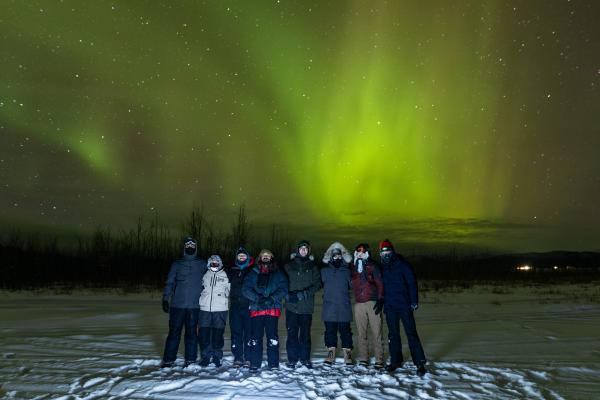
GPOE 2024 cohort Left to right: Jared Rivera, Skylar Danhoff, Tucker Evans, Shon Macke, Jack Heinzel, Scott Moroch, Jacob van de Lindt, and John Ball
John Ball
Shon Mackie & John Ball
MIT PSFC
Tuesday, February 20, 2024
12:00pm
NW17-218 Hybrid
Abstract: An expedition to Fairbanks, AK was undertaken during IAP by a team of eight graduate students to observe the geophysical plasma discharge known as Aurora Borealis. The quasiperiodic cycle of solar activity is projected to reach its maximum in 2024, which made this year an excellent opportunity to study the northern lights. Several diagnostics were designed, constructed, and deployed in the field, including an all-sky camera, 2-axis magnetometer, portable spectrometer, and RF receivers. We report on the observations made during the expedition and preliminary findings of the collected data, including photos, videos, magnetic field traces, spectra, and RF emissions.
Bio: Shon is a 3rd year physics PhD candidate developing neutron diagnostics for diagnosing burning plasmas in SPARC. In particular, his thesis work focuses on the development of a high-resolution neutron spectrometer for studying the kinetic physics of the burning plasma state. Before starting at MIT, Shon studied physics and mathematics at UCLA and received his BS in 2020. He took a gap year during the height of the Covid pandemic, spending the Summer canoeing the Missouri River from its headwaters in Montana to its confluence with the Mississippi in Missouri, and the Winter sleeping in his car to ski the Rockies. Shon is passionate about science outreach, and broadly interested in geophysics and performing physics research "in the field".
John Ball is a 3rd year PhD student in the Department of Nuclear Science and Engineering at MIT, working in the Plasma Science and Fusion Center on the development of spectrometric neutron detectors for the SPARC neutron camera. John graduated with a Bachelor's in physics from the University of Maryland, College Park in 2021 where he worked on the Centrifugal Mirror Fusion Experiment developing noble gas excimer based neutron diagnostics. Since joining MIT, John has also participated in the design and construction of the fusion outreach device Altator, and pursued research in the proliferation risks of DT-fueled magnetic confinement fusion systems.
This expidition was undertaken by S. Mackie, J. L. Ball, T. Evans, J. Rivera, S. Dannhoff, J. Heinzel, S. Moroch, J. van de Lindt